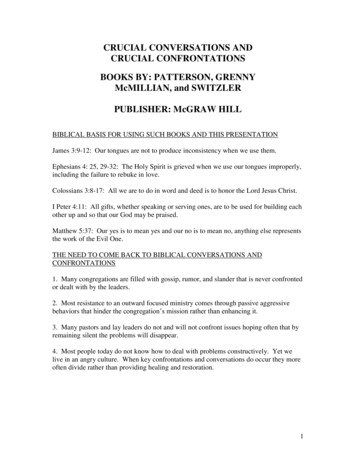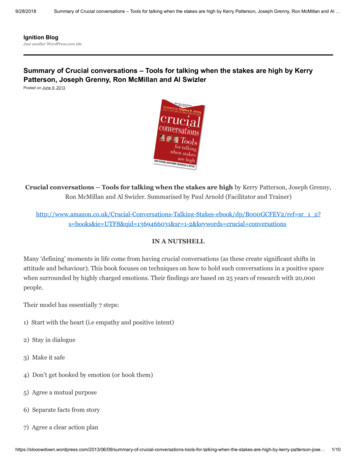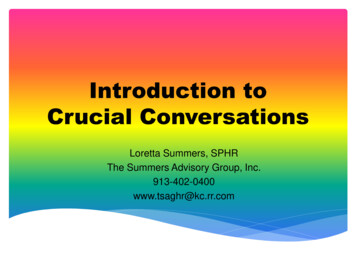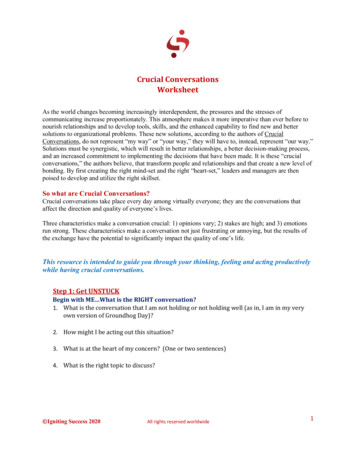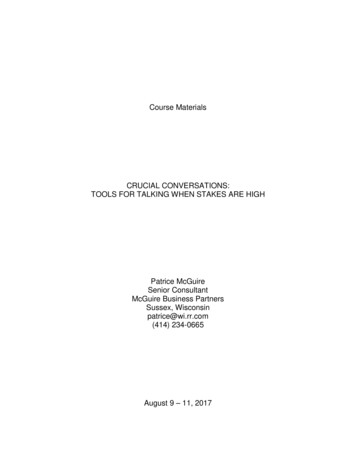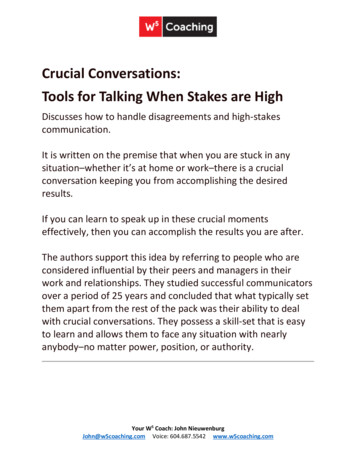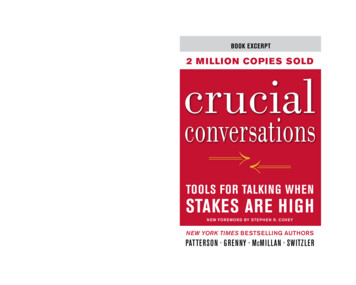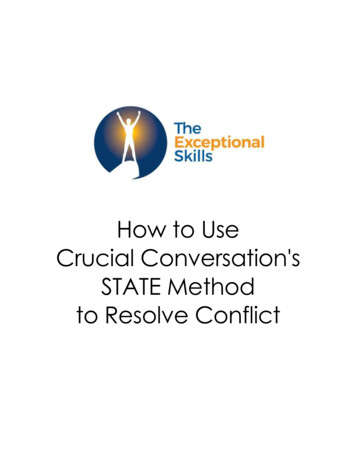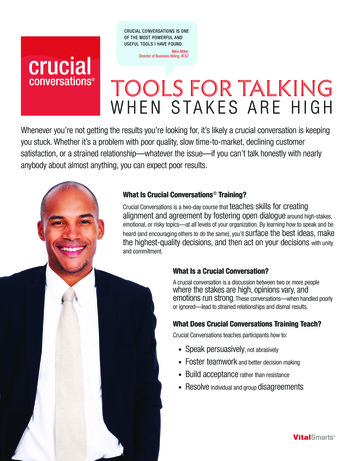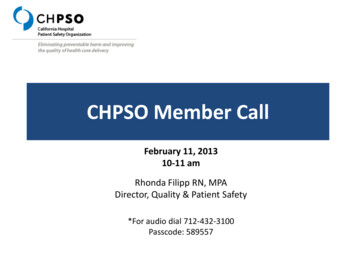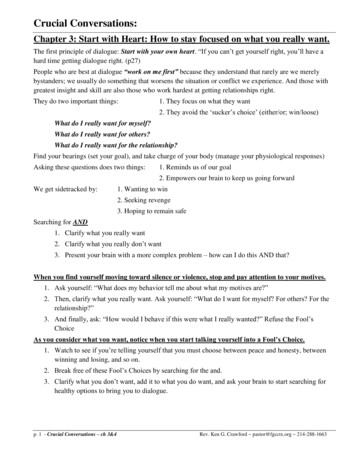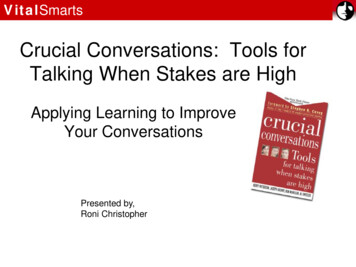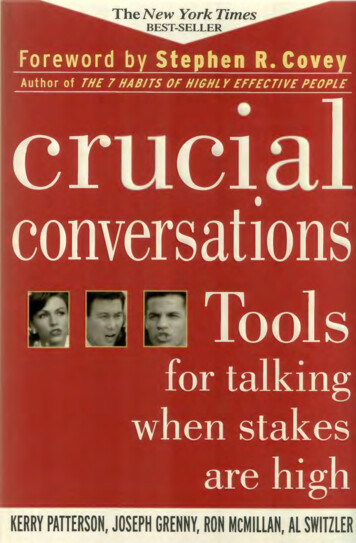
Transcription
PRAISE FOR CRUCIAL CONVERSATIONS"Relationships are the priority of life, and conversations are thecrucial element in profound caring of relationships. This bookhelps us to think about what we really want to say. If you wantto succeed in both talking and listening, read this book."-Dr. Lloyd J. Ogilvie, chaplain, United States Senate"Important, lucid, and practical, Crucial Conversations is abook that will make a difference in your life. Learn how to flour ish in every difficult situation."-Robert E. Quinn, ME Tracy Collegiate Professor ofOBHRM, University of Michigan Business School"I was personally and professionally inspired by this book-andI'm not easily impressed. In the fast-paced world of IT, the successof our systems, and our business, depends on crucial conversationswe have every day. Unfortunately, because our environment is sotechnical, far too often we forget about the 'human systems' thatmake or break us. These skills are the missing foundation piece."-Maureen Burke, manager of training,Coca-Cola Enterprises, Inc."The book is compelling. Yes, I found myself in too many of theirexamples of what not to do when caught in these worst-of-all worlds situations! GET THIS BOOK, WHIP OUT A PEN ANDGET READ Y TO SCRIBBLE MARGIN NOTES FURIOUSLY,AND PRACTICE, PRACTICE, PRACTICE THE INVALUABLETOOLS THESE AUTHORS PRESENT. I know I did-and ithelped me salvage several difficult situations and repair mydamaged self-esteem in others. I will need another copy prettysoon. as I'm wearing out the pages in this one!"-James Belasco. be s t sell ing author of Flight of the Buffalo,-l!l1trl!prl!l1eur. professor. und l!xl!cutive director of the FinancialTilllrs Knowkdgc Diuloguc
"Crucial Conversations is the most useful self-help book I haveever read.I'm awed by how insightful, readable, well organized,and focused it is. I keep thinking: 'If only I had been exposed tothese dialogue skills 30 years ago. '"-John Hatch, founder, FINCA International"One of the greatest tragedies is seeing someone with incredibletalent get derailed because he or she lacks some basic skills.Crucial Conversations addresses the number one reason execu tives derail, and it provides extremely helpful tools to operate ina fast-paced, results-oriented environment."-Karie A. Willyerd, chief talent officer, Solectron"The book prescribes, with structure and wit, a way to improve onthe most fundamental element of organizational learning andgrowth-honest, unencumbered dialogue between individuals.There are one or two of the many leadership/management'thought' books on my shelf that are frayed and dog-eared fromuse.Crucial Conversations will no doubt end up in the same con dition."-John Gill, VP of Human Resources, Rolls Royce USA
CrucialConversations
CrucialConversationsTools for TalkingWhen Stakes Are HighbyKerry Patterson, Joseph Grenny,Ron McMillan, and AI SwitzlerMCGRAW-HILLNew YorkLondonChIcagoMadrzdSan JuanSeoulSan FrancIscoMexIco CItySingaporeMIlanSydneyLIsbonNew DelhIToronto
Library of Congress Cataloging-in-Publication DataCrucial Conversations : tools for talking when stakes are high / KerryPatterson . [et al.].p.cm.Includes bibliographical references and index.ISBN 0-07-140194-61. International communication.2. Interpersonal relations.I.Patterson, Kerry, llA Divisionof The McGraw·Hill Companies Copyright 2002 by Kerry Patterson, Joseph Grenny, Ron McMillan, and Al Switzler.All rights reserved. Printed in the United States of America. Except as permittedunder the United States Copyright Act of 1976, no part of this publication may bereproduced or distributed in any form or by any means, or stored in a data base orretrieval system, without the prior written permission of the publisher.29 30 31 32 33 34 35DOC/DOC0 9 8 7ISBN 0-07-140194-6This book was set in R Life Roman by Patricia Caruso of McGraw-Hill Professional'sDTP composition unit in Hightstown, N.J.Printed and bound by R.R. Donnelly & Sons Company.McGraw-Hill books are available at special quantity discounts to use as premiums andsales promotions, or for use in corporate training programs. For more information,please write to the Director of Special Sales, Professional Publishing, McGraw-Hill,Two Penn Plaza, New York, NY 10121-2298. Or contact your local bookstore.
We dedicate this book toLouise, Celia, Bonnie, and Lindawhose support is abundant,whose love is nourishin and whose patience is just shy of infinite.And to our childrenChristine, Rebecca, Taylofi Scott,Aislinn, Carat Seth, Samue Hyrum,Ambefi Megan, Chase, Hayley, Bryn,Ambefi Laura, Becca, Rachael, Benjamin,Meridith, Lindsey, Kelley, Toddwho have been a wonderful source of learning.
ContentsFOREWORDXIACKNOWLEDGMENTSXVCH. 1: What's a Crucial Conversation?And Who Cares? 1CH. 2: Mastering Crucial ConversationsThe Power of Dialogue 17CH. 3: Start with HeartHow to Stay Focused on What You Really Want 27CH. 4: Learn to LookHow to Notice When Safety Is at Risk 45CH. 5: Make It SafeHow to Make It Safe to Talk about Almost Anything 65CH. 6: Master My StoriesHow to Stay in Dialogue When You 're Angry,Scared, or Hurt 93
X CONTENTSCH. 7: STATE My PathHow to Speak Persuasively, Not Abrasively 119CH. 8: Explore Others' PathsHow to Listen When Others Blow Up or Clam Up 141CH. 9: Move to ActionHow to Turn Crucial Conversationsinto Action and Results 161CH. 10: Putting It All TogetherTools for Preparing and Learning 179CH. 11: Yeah, ButAdvice for Tough Cases 193CH. 12: Change Your LifeHow to Turn Ideas into Habits 215ENDNOTESINDEX229231
ForewordThis is a breakthrough book. That is exactly how I saw it whenI first read the manuscript. I so resonated with the importance,power, and timeliness of its message that I even suggested to theauthors that they title it "Breakthrough Conversations." But as Iread deeper, listened to the tapes, and experienced the insightborne of years of experience with this material, I came to under stand why it is titled Crucial Conversations.From my own work with organizations, including families,and from my own experience, I have come to see that there area few defining moments in our lives and careers that make allthe difference. Many of these defining moments come from"crucial" or "breakthrough" conversations with important peo ple in emotionally charged situations where the decisions madetake us down one of several roads, each of which leads to anentirely different destination.I can see the wisdom in the assertion of the great historianArnold Toynbee, who said that you can pretty well summarize allof history-not only of society, but of institutions and of people in four words: Nothing fails like success. In other words, whena challenge in life is met by a response that is equal to it, youhave success. But when the challenge moves to a higher level,the old, once successful response no longer works-it fails;thus, nothing fails like success.
XII FOREWORDThe challenge has noticeably changed for our lives, our fami lies, and our organizations. Just as the world is changing atfrightening speed and has become increasingly and profoundlyinterdependent with marvelous and dangerous technologies, so,too, have the stresses and pressures we all experience exponen tially increased. This charged atmosphere makes it all the moreimperative that we nourish our relationships and develop tools,skills, and enhanced capacity to find new and better solutions toour problems.These newer, better solutions will not represent "my way" or"your way"-they will represent "our way." In short, the solu tions must be synergistic, meaning that the whole is greater thanthe sum of the parts. Such synergy may manifest itself in a bet ter decision, a better relationship, a better decision-makingprocess, increased commitment to implement decisions made,or a combination of two or more of these.What you learn is that "crucial conversations" transform peo ple and relationships. They are anything but transacted; theycreate an entirely new level of bonding. They produce whatBuddhism calls "the middle way"-not a compromise betweentwo opposites on a straight-line continuum, but a higher middleway, like the apex of a triangle. Because two or more peoplehave created something new from genuine dialogue, bondingtakes place-just like the bonding that takes place in family ormarriage when a new child is created. When you produce some thing with another person that is truly creative, it's one of themost powerful forms of bonding there is. In fact the bonding isso strong that you simply would not be disloyal in his or herabsence, even if there were social pressure to join others in bad mouthing.The sequential development of the subject matter in this bookis brilliant. It moves you from understanding the supernal power
FOREWORD XIIIof dialogue, to clarifying what you really want to have happen andfocusing on what actually is happening, to creating conditions ofsafety, to using self-awareness and self-knowledge. And finally, itmoves you to learning how to achieve such a level of mutualunderstanding and creative synergy that people are emotionallyconnected to the conclusions reached and are emotionally willingand committed to effectively implementing them. In short, youmove from creating the right mind- and heart-set to developingand utilizing the right skill-set.In spite of the fact that I have spent many years writing andteaching similar ideas, I found myself being deeply influenced,motivated, and even inspired by this material-learning new ideas,going deeper into old ideas, seeing new applications, and broaden ing my understanding. I've also learned how these new techniques,skills, and tools work together in enabling crucial conversationsthat truly create a break with the mediocrity or mistakes of thepast. Most breakthroughs in life truly are "break-withs."When I first put my hands on this book, I was delighted to seethat dear friends and colleagues had drawn on their entire livesand professional experiences to not only address a tremendouslyimportant topic, but also to do it in a way that is so accessible, sofun, so full of humor and illustration, so full of common senseand practicality. They show how to effectively blend and use bothintellectual (1.0.) and emotional intelligence (E.O.) to enablecrucial conversations.I remember one of the authors having a crucial conversationwith his professor in college. The professor felt that this studentwas neither paying the price in class nor living up to his potential.This student, my friend, listened carefully, restated the professor'sconcern, expressed appreciation for the professor's affirmation ofhis potential and then smilingly and calmly said, "My focus is on,
XIV FOREWORDother priorities, and the class is just not that important to me atthis time. I hope you can understand." The teacher was takenaback, but then started to listen. A dialogue took place, newunderstanding was achieved, and the bonding was deepened.I know these authors to be outstanding individuals andremarkable teachers and consultants, and have even seen themwork their magic in training seminars-but I didn't know if theycould take this complex topic and fit it into a book. They did. Iencourage you to really dig into this material, to pause and thinkdeeply about each part and how the parts are sequenced. Thenapply what you've learned, go back to the book again, learnsome more, and apply your new learnings. Remember, to knowand not to do is really not to know.I think you'll discover, as have I, that crucial conversations, aspowerfully described in this book, reflect the insight of thisexcerpt of Robert Frost's beautiful and memorable poem, "TheRoad Not Taken":Two roads diverged in a yellow wood,And sorry I could not travel bothAnd be one traveler, long I stoodAnd looked down one as far as I couldTo where it bent in the undergrowth; . . .I shall be telling this with a sighSomewhere ages and ages hence:Two roads diverged in a wood, and I I took the one less traveled by,And that has made all the difference.- Stephen R. Covey
AcknowledgmentsWe are deeply grateful to many.First, to our colleagues at VitalSmarts, we express apprecia tion for creativity, discipline, competence, and friendship.Thanks to Charla Allen, James Allred, Mike Carter, BensonDastrup, Kevin Koger, Kevin Sheehan, Jed Thompson, MindyWaite, and Yan Wang.Also we appreciate our colleagues for their indispensable helpin teaching and testing these ideas: Bemell Christensen, LarryMyler, Bev Roesch, and Steve Willis.And to our associate friends who have worked hard to changelives and organizations with these concepts-and providedinvaluable feedback for refining them: Mike Allen, Karol Bailey,Pat Banks, Mike Cook, Brint Driggs, Simon Lia, Mike Miller, JimMunoa, Stacy Nelson, Larry Peters, Betsy Pickren, MikeQuinlan, Ron Ragain, James Sanwick, Kurt Southam, NeilStaker, Joe Thigpen, and Michael Thompson.Thanks to our agent, Michael Broussard, for getting us theopportunity to share our message. And thanks to our editor,Nancy Hancock, a world-class partner in producing this bookand a master of crucial conversations.And one final, sweeping, large thanks. So many have helpedus over the years, that we add this admittedly blanket thanks tothe clients, colleagues, friends, teachers, and associates onwhose shoulders we stand.
1The void created by the failure to communicateis soon filled with poison, drive andmlstepre entation.-c.NORTHCOTE PARKINSONWhat's a CrucialConversation?And Who Cares?When people first hear the term "crucial conversation," manyconjure up images of presidents, emperors, and prime ministersseated around a massive table while they debate the future of theworld. Although it's true that such discussions have a wide sweeping and lasting impact, they're not the kind we have inmind. The crucial conversations we're referring to in the title ofthis book are interactions that happen to everyone. They're theday-to-day conversations that affect your life.Now, what makes one of your conversations crucial as opposedto plain vanilla? First, opinions vary. For example, you're talkingwith your boss about a possible promotion. She thinks you'renot ready; you think you are. Second, stakes are high. You're in
a meeting with four coworkers and you're trying to pick a newmarketing strategy. You've got to do something different or yourcompany isn't going to hit its annual goals. Third, emotions runstrong. You're in the middle of a casual discussion with yourspouse and he or she brings up an "ugly incident" that took placeat yesterday's neighborhood block party. Apparently not only didyou flirt with someone at the party, but according to your spouse,"You were practically making out." You don't remember flirting.You simply remember being polite and friendly. Your spousewalks off in a huff.And speaking of the block party, at one point you're makingsmall talk with your somewhat crotchety and always colorfulneighbor about his shrinking kidneys when he says, "Speaking ofthe new fence you're building . . . " From that moment on youend up in a heated debate over placing the new fence-threeinches one way or the other. Three inches ! He finishes by threat ening you with a lawsuit, and you punctuate your points by men tioning that he's not completely aware of the difference betweenhis hind part and his elbow. Emotions run really strong.What makes each of these conversations crucial-and not sim ply challenging, frustrating, frightening, or annoying-is that theresults could have a huge impact on the quality of your life. In eachcase, some element of your daily routine could be forever alteredfor better or worse. Clearly a promotion could make a big differ ence. Your company's success affects you and everyone you workwith. Your relationship with your spouse influences every aspect ofyour life. Even something as trivial as a debate over a property lineaffects how you get along with your neighbor. If you handle even aseemingly insignificant conversation poorly, you establish a patternof behavior that shows up in all of your crucial conversations.By definition, crucial conversations are about tough issues.Unfortunately, it's human nature to back away from discussionswe fear will hurt us or make things worse. We're masters at avoid ing these tough conversations. Coworkers send email to caI.:h
other when they should walk down the hall and talk turkey. Bossesleave voice mail in lieu of meeting with their direct reports. Familymembers change the subject when an issue gets too risky. We (theauthors) have a friend who learned through a voice-mail messagethat his wife was divorcing him. We use all kinds of tactics tododge touchy issues.But it doesn't have to be this way. If you know how to handle(even master) crucial conversations, you can step up to and effec tively hold tough conversations about virtually any topic.Crucial Conversation (kroo shel kan'viir sa'shen)nA discussion between two or more people where ( 1 ) stakes arehigh, (2) opinions vary, and (3) emotions run strong.HOW DO WE TYPICALLY HANDLE CRUCIALCONVERSATIONS?Just because we're in the middle of a crucial conversation (ormaybe thinking about stepping up to one) doesn't mean thatwe're in trouble or that we won't fare well. In truth, when weface crucial conversations, we can do one of three things: We can avoid them. We can face them and handle them poorly. We can face them and handle them well.That seems simple enough. Walk away from crucial conversa tions and suffer the consequences. Handle them poorly and suf fer the consequences. Or handle them well."I don't know," you think to yourself. "Given the three choic es, I'll go with handling them well."We're on Our Worst BehaviorBut do we handle them wel l? When talking turns tough, do wepause, takc a deep brcuth, u nnl. uncc to our innerselves, "Uh-oh,
4 CRUCIAL CONVERSATIONSthis discussion is crucial. I'd better pay close attention" and thentrot out our best behavior? Or when we're anticipating a poten tially dangerous discussion, do we step up to it rather than scam per away? Sometimes. Sometimes we boldly step up to hot topics,monitor our behavior, and offer up our best work. We mind ourPs and Os. Sometimes we're just flat-out good.And then we have the rest of our lives. These are the momentswhen, for whatever reason, we either anticipate a crucial conver sation or are in the middle of one and we're at our absoluteworst-we yell; we withdraw; we say things we later regret. Whenconversations matter the most-that is, when conversations movefrom casual to crucial-we're generally on our worst behavior.Why is that?We're designed wrong. When conversations tum from routineto crucial, we're often in trouble. That's because emotions don'texactly prepare us to converse effectively. Countless generationsof genetic shaping drive humans to handle crucial conversationswith flying fists and fleet feet, not intelligent persuasion and gen tle attentiveness.For instance, consider a typical crucial conversation. Someonesays something you disagree with about a topic that matters agreat deal to you and the hairs on the back of your neck stand up.The hairs you can handle. Unfortunately, your body does more.Two tiny organs seated neatly atop your kidneys pump adrenalineinto your bloodstream. You don't choose to do this. Your adrenalglands do it, and then you have to live with it.And that's not all. Your brain then diverts blood from activi ties it deems nonessential to high-priority tasks such as hittingand running. Unfortunately, as the large muscles of the armsand legs get more blood, the higher-level reasoning sections ofyour brain get less. As a result, you end up facing challengingconversations with the same equipment available to a rhesusmonkey.
WHAT'S A CRUCIAL CONVERSATION? 5We're under pressure. Let's add another factor. Crucial con versations are frequently spontaneous. More often than not, theycome out of nowhere. And since you're caught by surprise,you're forced to conduct an extraordinarily complex humaninteraction in real time-no books, no coaches, and certainly noshort breaks while a team of therapists runs to your aid andpumps you full of nifty ideas.What do you have to work with? The issue at hand, the otherperson, and a brain that's preparing to fight or take flight. It's lit tle wonder that we often say and do things that make perfect sensein the moment, but later on seem, well, stupid."What was I thinking?" you wonder.The truth is, you were real-time multitasking with a brain thatwas working another job. You're lucky you didn't suffer a stroke.We're stumped. Now let's throw in one more complication.You don't know where to start. You're making this up as you goalong because you haven't often seen real-life models of effec tive communication skills. Let's say that you actually plannedfor a tough conversation-maybe you've even mentallyrehearsed. You feel prepared, and you're as cool as a cucumber.Will you succeed? Not necessarily. You can still screw up,because practice doesn't make perfect; perfect practice makesperfect.This means that first you have to know what to practice.Sometimes you don't. After all, you may have never actually seenhow a certain problem is best handled. You may have seen whatnot to do-as modeled by a host of friends, colleagues, and, yes,even your parents. In fact, you may have sworn time and againnot to act the same way.Left with no healthy models, you're now more or lessstumped. So what do you do? You do what most people do. Youwing it. You piece together the words, create a certain mood, andotherwise make up what you think will work-all the while
6 CRUCIAL CONVERSATIONSmultiprocessing with a half-starved brain. It's little wonder thatwhen it matters the most, we're often at our worst behavior.We act in self-defeating ways. In our doped-up, dumbed-downstate, the strategies we choose for dealing with our crucial con versations are perfectly designed to keep us from what we actu ally want. We're our own worst enemies-and we don't evenrealize it. Here's how this works.Let's say that your significant other has been paying less andless attention to you. You realize he or she has a busy job, butyou still would like more time together. You drop a few hintsabout the issue, but your loved one doesn't handle it well. Youdecide not to put on added pressure, so you clam up. Of course,since you're not all that happy with the arrangement, your dis pleasure now comes out through an occasional sarcastic remark."Another late night, huh? Do you really need all of themoney in the world?"Unfortunately (and here's where the problem becomes self defeating) , the more you snip and snap, the less your loved onewants to be around you. So your significant other spends evenless time with you, you become even more upset, and the spi ral continues. Your behavior is now actually creating the verything you didn't want in the first place. You're caught in anunhealthy, self-defeating loop.Or consider what's happening with your roommate Terry who wears your and your other two roommates' clothes (withoutasking)-and he's proud of it. In fact, one day while walking outthe door, he glibly announced that he was wearing somethingfrom each of your closets. You could see Taylor's pants, Scott'sshirt, and, yes, even Chris's new matching shoes-and-socksensemble. What of yours could he possibly be wearing? Eww!Your response, quite naturally, has been to bad-mouth Terrybehind his back. That is until one day when he overheard you
WHATS A CRUCIAL CONVERSATION? 7belittling him to a friend, and you're now so embarrassed that youavoid being around him. Now when you're out of the apartment,he wears your clothes, eats your food, and uses your computerout of spite.Let's try another example. You share a cubicle with a four-starslob and you're a bit of a neat freak. In Odd Couple parlance,you're Felix and he's Oscar. Your coworker has left you noteswritten in grease pencil on your file cabinet, in catsup on the backof a french-fry bag, and in permanent marker on your desk blot ter. You, in contrast, leave him typed Post-it notes. Typed.At first you sort of tolerated each other. Then you began to geton each other's nerves. You started nagging him about cleaningup. He started nagging you about your nagging. Now you'rebeginning to react to each other. Every time you nag, he becomesupset, and, well, let's say that he doesn't exactly clean up. Everytime he calls you an "anal-retentive nanny," you vow not to givein to his vile and filthy ways.What has come from all this bickering? Now you're neaterthan ever, and your cubicle partner's half of the work area isabout to be condemned by the health department. You're caughtin a self-defeating loop. The more the two of you push eachother, the more you create the very behaviors you both despise.Some Com mon Crucial ConversationsIn each of these examples of unhealthy self-perpetuation, thestakes were moderate to high, opinions varied, and emotions ranstrong. Actually, to be honest, in a couple of the examples thestakes were fairly low at first, but with time and growing emo tions, the relationship eventually turned sour and quality of lifesuffered-making the risks high.These examples, of course, are merely the tip of an enormousand ugly iceberg of problems stemming from crucial conversations
8CRUCIAL CONVERSATIONSthat either have been avoided or have gone wrong. Other topicsthat could easily lead to disaster include Ending a relationship Talking to a coworker who behaves offensively or makes sugges tive comments Asking a friend to repay a loan Giving the boss feedback about her behavior Approaching a boss who is breaking his own safety or qualitypolicies Critiquing a colleague's work Asking a roommate to move out Resolving custody or visitation issues with an ex-spouse Dealing with a rebellious teen Talking to a team member who isn't keeping commitments Discussing problems with sexual intimacy Confronting a loved one about a substance abuse problem Talking to a colleague who is hoarding infonnation or resources Giving an unfavorable performance review Asking in-laws to quit interfering Talking to a coworker about a personal hygiene problemOUR AUDACIOUS CLAIMLet's say that either you avoid tough issues or when you do bringthem up, you're on your worst behavior. What's the big deal?How high are the stakes anyway? Do the consequences of afouled-up conversation extend beyond the conversation itself?Should you worry?
WHAT'S A CRUCIAL CONVERSATION? 9Actually, the effects of conversations gone bad can be bothdevastating and far reaching. Our research has shown that strongrelationships, careers, organizations, and communities all drawfrom the same source of power-the ability to talk openly abouthigh-stakes, emotional, controversial topics.So here's the audacious claim. Master your crucial conversa tions and you'llkick-start your career, strengthen your relation ships, and improve your health. As you and others master high stakes discussions, you'll also vitalize your organization and yourcommunity.Kick-Start Your CareerCould the ability to master crucial conversations help your career?Absolutely. Twenty-five years of research with twenty thousandpeople and hundreds of organizations has taught us that individu als who are the most influential-who can get things done, and atthe same time build on relationships-are those who master theircrucial conversations.For instance, high performers know how to stand up to theboss without committing career suicide. We've all seen peoplehurt their careers over tough issues. You may have done it your self. Fed up with a lengthy and unhealthy pattern of behavior, youfinally speak out-but a bit too abruptly. Oops. Or maybe anissue becomes so hot that as your peers twitch and fidget them selves into a quivering mass of potential stroke victims, youdecide to say something. It's not a pretty discussion-but some body has to have the guts to keep the boss from doing somethingstupid. (Gulp.)As it turns out, you don't have to choose between being hon est and being effective. You don't have to choose between candorand your career. People who routinely hold crucial conversationsand hold them well are able to express controversial and even
1 0 CRUCIAL CONVERSATIONSrisky opinions in a way that gets heard. Their bosses, peers, anddirect reports listen without becoming defensive or angry.What about your career? Are there crucial conversations thatyou're not holding or not holding well? Is this undermining yourinfluence? And more importantly, would your career take a stepforward if you could improve how you're dealing with theseconversations?Improve Your OrganizationOkay, so individual careers may sink or swim based on crucialconversations, but how about organizations? Surely a soft-and gushy factor such as how you talk to one another doesn't have animpact on the not so soft-and-gushy bottom line.For twenty-five years we (the authors) explored this very issue.We (and hundreds of others) searched for keys to organizationalsuccess. Most of us studying the elusive topic figured that some thing as large as a company's overall success would depend onsomething as large as a company's strategy, structure, or systems.After all, organizations that maintain best-in-class productivityrely on elegant performance-management systems. Widespreadproductivity couldn't result from anything less, could it? Weweren't alone in our thinking. Every organization that attemptedto bring about improvements-at least the companies we hadheard of-began by revamping their performance-managementsystems.Then we actually studied those who had invested heavily inspiffy new performance-management systems. It turns out thatwe were dead wrong. Changing structures and systems alone didlittle to improve performance. For example, one study of fivehundred stunningly productive organizations reveale
PRAISE FOR CRUCIAL CONVERSATIONS "Relationships are the priority of life, and conversations are the crucial element in profound caring of relationships. This book helps us to think about what we really want to say. If you want to succeed in both talking and listening, read this book." -Dr. Lloyd J. Ogilvie, chaplain, United States Senate
